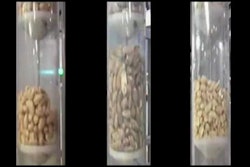That is one of the reasons why transportation features so heavily in sustainability considerations. Wal-Mart drew attention to the impacts of transportation when it included greater cube utilization on its packaging scorecard.
Companies typically experience an immediate reduction in overall transportation costs following a decrease in the size and weight of packages. Containerboard, package design, and logistics software companies are making significant contributions to greater cube utilization and the reduction of transportation costs. There is also the national economic benefit of less fuel consumed by truck fleets and the global environmental advantage of fewer greenhouse gases emitted.
Reusable packaging
In a number of applications, including fresh produce, poultry and meats, beverages, and dairy products, reusable packaging palettes and shipping containers are options that increasingly more producers are adopting. Reuse—along with reduce and recycle—is foundational for improving sustainability.
In 2004, the industry advocacy group The Reusable Packaging Association, commissioned a lifecycle analysis of produce shipping. The Franklin Associates lifecycle analysis found that: “On average across all 10 produce applications, RPCs (reusable plastic containers) require 39% less total energy, produce 95% less total solid waste, and generate 29% less total greenhouse gas emissions.”
The authors of the study went on to say, “Multiple trips (‘turns’) in an RPC closed operating system lead to materials efficiencies that create relatively low environmental burdens that are only partly offset by backhaul and cleaning steps.” In other words, the effects of returning and cleaning the RPCs did not appreciably diminish the gains made by reusing packaging. (An executive summary of the report can be found under library research on the Reusable Packaging Association’s Web site.)
Thomas Sandberg, director of new business development, Tosca, LTD, a reusable packaging systems supplier, says that reusable packaging makes sense for companies that have:
- Under-utilized trailer space
- Frequent trips
- Recurring product damage or risk of damage
- Inefficient storage/warehouse space
- High volume of solid waste
- Significant need for cleanliness/hygiene
- Multiple component parts or complicated assembly operations
- Expensive, expendable packaging or recurring single-use packaging costs
“There are challenges to setting up a returnable packaging program,” says Sandberg. “To succeed, the producer, transporter, retailer, and reusable packaging company must effectively create and then participate in a closed loop system.”
“It is not for every application,” Sandberg continued. “In a growing number of situations, however, reusable packaging in a closed loop system, or a supply chain that can be closed with the help of a third party; can be the ideal solution for improving sustainability—an overall reduction in environmental impacts and materials consumed. As material and transportation costs continue to rise and as the systems approach permeates the sustainability movement, reusable packaging, including containers and pallets, will become a standard for many industries and applications.”

























